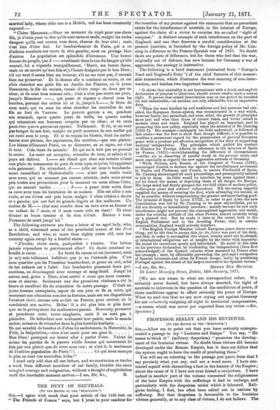THE DUTY OF NEUTRALS. [TO THE EDITOR OF TRH SPECTATOR."]
Sir.,-1 agree with much that your article of the 14th inst. on " The Friends of France " says, but I trust to your candour for the insertion of my protest against the statement that no precedent exists for the interference of neutrals, in the interest of Europe, against the claim of a victor to exeicise his so-called " right of conquest." A distinct example of such interference on the part of England, and one that deserves a careful consideration at the present juncture, is furnished by the foreign policy of Mr. Can- ning in reference to the Franco-Spanish war of 1823. No doubt there are points of difference, but for those who feel that the war, originally one of defence, has now become for Germany a war of aggression, the analogy is instructive.
The following is a brief statement (extracted from " Europe's Need and England's Duty ") of the chief features of this memor- able transaction, which illustrates the true meaning of non-inter- vention, and teaches two important lessons :-
" It shows that neutrality is not inconsistent with a frank and explicit declaration of purpose to intervene, should events render such a course right. It proves that armed intervention may at one period be uncalled, for and undesirable,—at another, not only admissible, but an imperative duty. . . . . • • • .....
" When the wars kindled by evil traditions and bad passions had sub- sided, the European States-system was reconstructed in a way which, however faulty, has permitted, and even aided, the growth of principles more just and wise than those of former times, and better suited to modern ideas and wants. England has played an important part is promoting this new policy, especially since the ministry of Mr. Canning (1822-7). His example—unhappily too little understood or followed of late years—was the first to show that, though difficult, it is possible to combine a paramount regard for the preservation of general European peace with a prudent yet effective recognition of the duty of supporting national independence. The principles which guided his conduct as Minister for Foreign Affairs, in reference to the invasion of Spain by France (1823)—notwithstanding the difference of circumstances —strike me as deserving of careful study in the present crisis, and more especially as regards the now aggressive attitude of Germany.
" While Prussia, with Russia, at the Congress of Verona (1822), encouraged Austria to declare war against the revolutionary movement in Naples and Piedmont, and France, to restore Ferdinand of Spain, Mr. Canning discouraged all such proceedings, and peremptorily refused to join in them. As little would he interfere by arms against them . yet he found the means of depriving them of all danger for Europe. His large mind had firmly grasped the two-fold object of modern policy, —European peace and national independence. His far-seeing sagacity supplied the means of securing the first, while advancing the second, as far as possible, without compromising the greater and more lasting good. The invasion of Spain by Louis XVIII., in order to put down the new Constitution, was felt by Mr. Canning to be most unjustifiable, yet he did not directly or immediately interfere ; mainly because he saw such interference might not prevent the contemplated aggression, and would, under the existing attitude of the other Powers, almost certainly bring on a general war. But he made it clear at the outset, both to the English Parliament and to the invading Power, that, in certain eventualities, England would actively interfere.
" The English Foreign Minister valued European peace above every- thing ; yet he felt that to secure this for the future was part of his duty,. and that, in order to accomplish this object, victory must not be abused, or international obligations set at naught by the victor with impunity. He stated his intentions openly and beforehand. He acted in due time on his previous declaration, by vindicating the independence (then first acknowledged) of the Spanish colonies when menaced by France after her triumph ; next, by effectually preventing the prolonged occupation of Spanish fortresses and cities by French troops ; lastly, by sustaining Portugal against the attack of the despot restored to the Spanish throne."
10 Lower Mountjoy Street, Dublin, 16th January, 1871.
[We are not aware to what our correspondent refers. We certainly never denied, but have always asserted, the right of neutrals to intervene in the question of the conditions of peace, if those conditions appear to affect seriously the peace of Europe. What we said was that we are now crying out against Germany for not voluntarily resigning all right to territorial compensation, —a course which was never yet expected from any victor.—ED. Spectator.]






























 Previous page
Previous page